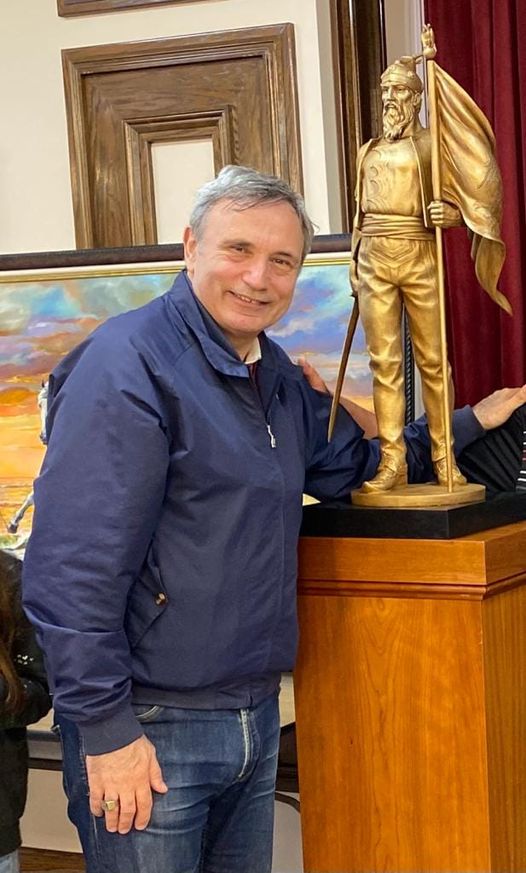
Interviewed by Rafaela Prifti/
Working for decades as a journalist of the Italian media and as a descendant of the Kastrioti family, you may have had an opportunity to go deeper into the needs of the old-time Arberesh community and the new generations? What are those needs?
L.C.S – The risks of loosing the language and traditions are present. The effect of the social media has corrupted the interests of the young generations in terms of studying their history and cultivating the language of their ancestors. So we have to focus our efforts on projects directed at preserving the language. The legislature allows for the municipalities to fund programs to minorities for the purposes of keeping alive the language. In some cases, it is done through schools but also other projects.
What would be effective in countering today’s fast media consumption with respect to drawing in young people in the community?
L.C.S – By finding out what their interests are and what draws them in, whether is dancing in traditional costumes like we saw at the Albanian Worcester Festival in early June or singing old Albanian songs at different music events.
In your town, with your own family, how do you see the youth connecting with you and your interests?
L.C.S – I admit it is a tough job to pass down the traditions and responsibility that comes with being a member of this family. I have long maintained that we deserve to have this respectful name in Albanian history and be representatives of carrying it in the community. For that, we have to act properly and cannot be a negative example. In this regard, I believe that organizing speaking events and town meetings on various historic topics is very important. A targeted approach would be necessary for a good outcome.
Such an approach would imply among other considerations one or more platforms that allows for a greater reach. So there is the issue of platforms where each age group has preferential differences. More importantly, whose job is that? Who would take on such projects?
L.C.S – I think all the people that love Albanian people, history and culture. For us, it starts with loving your roots. When it is genuine, others respond to that. Communication is at the heart of this. When it is done professionally, then you can reach any target.
Do you see yourself as an interlocutor between the young generation and your ancestors, or between your sons and their grandparents or great great grandparents? https://gazetadielli.com/i-ftuar-ne-festivali-i-usterit…/
L.C.S – I hope that I have placed myself in that sport because it has been my goal through my profession, my hobbies including historical research. The times we live in does not make it easy. Yet since I am journalist I think that I can reach larger audiences.
So, talk to me about your family? How do you reach to them?
L.C.S – I have two brothers, two sons. My father’s name was George and also my brother. Since there are many family members called George, they have two or three middle names to tell them apart. I am an exception because my mother loved the name Loris.
What was it like for you to take part at the Albanian Worcester Festival this year and your first visit to the US?
L.C.S – First of all, the great enthusiasm of the event. The organization that runs it is amazing. The mayor of Piana degli Albanesi Rosario Petta, and I, as representatives of the Arberesh community were received so warmly. We were told that is the oldest festival in the Albanian American diaspora, and the number of the participants was truly impressive. Only the first two nights out of the three day event saw around 13 thousand people gather on the grounds. At this time we don’t have the exact numbers.
What is the take away for you? What would you tell people back home about the visit and the 2023 Festival? https://gazetadielli.com/prurje-te-reja-ne-historine-e…/
L.C.S – Number one is the family-like atmosphere. We became brothers at first sight. We went into people’s homes and got an especially warm welcome everywhere. That is what I will say to the people of “the Arberia land”. Furthermore, I will confirm what I have said in my speeches that as descendants of Albanian origin who have derived from Illyrian tribes, therefore we are all one people, divided by 1000 years of history and the sea. Yet I say that the sea is now a bridge not a divider.
Will you bring your sons through that bridge next time you visit here or Albania?
L.C.S – That would be my hope. And also to see the new street named after the national hero.
What was it like to see the name of Gjergj Kastrioti Skenderbeu as an honorary street sign in Worcester?
L.C.S – The mayor of Worcester was so kind to invite us inside the chambers at the City Council. He gifted us the street signs and will take it home with us.
Do you have a lot of streets named after Gjergj Kastrioti in towns back home?
L.C.S – Yes, many. Corso Georgio Castriota Skenderbeg is the main street in many Southern Italian towns.
You said that you were touched by the hospitality of the community here. I would point out that the Arberesh hold a special place for Albanians all over the world. Part of it, if I may, is because you represent a great part of our history, and we honor you for that.
L.C.S – I hope that it will always be this way!
Thank you and safe travels!
Saint George Albanian Orthodox Cathedral, Boston, June 7, last full day of the visit in the US
Photo Credit Ardian Murraj: Loris Castriota Scanderbegh standing next to a miniature sculpture of Gjergj Kastrioti Skenderbeu